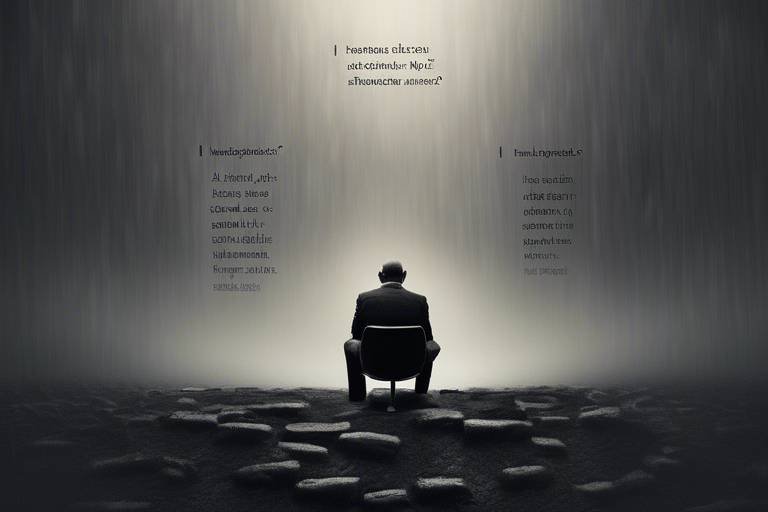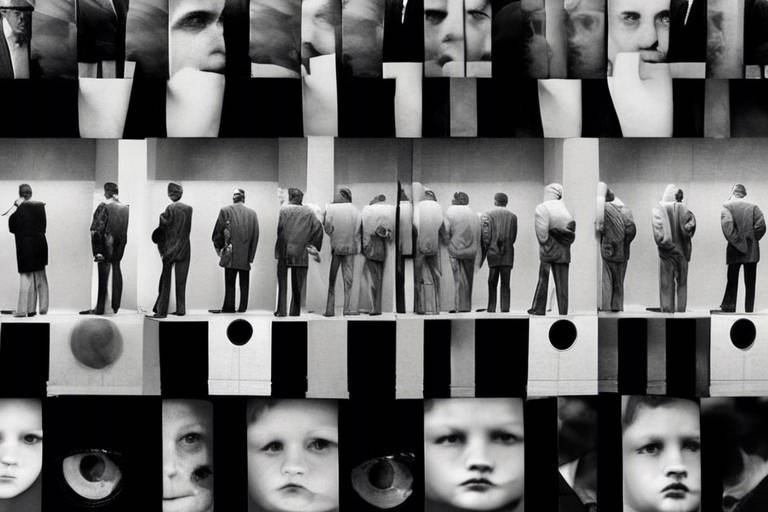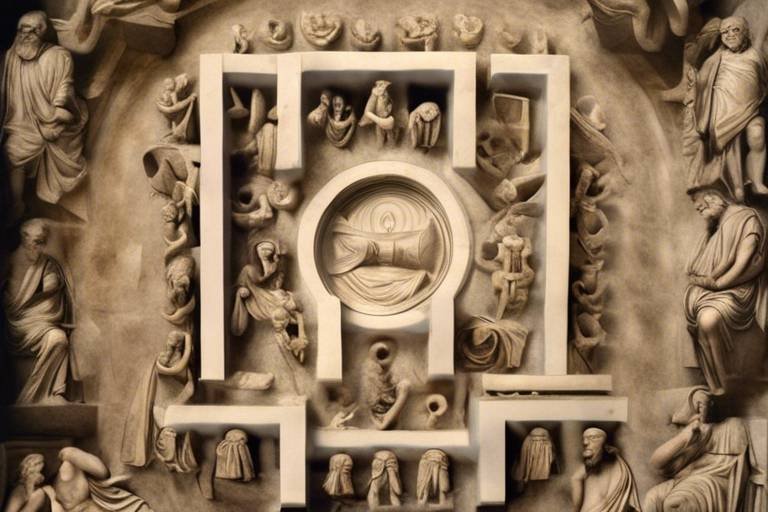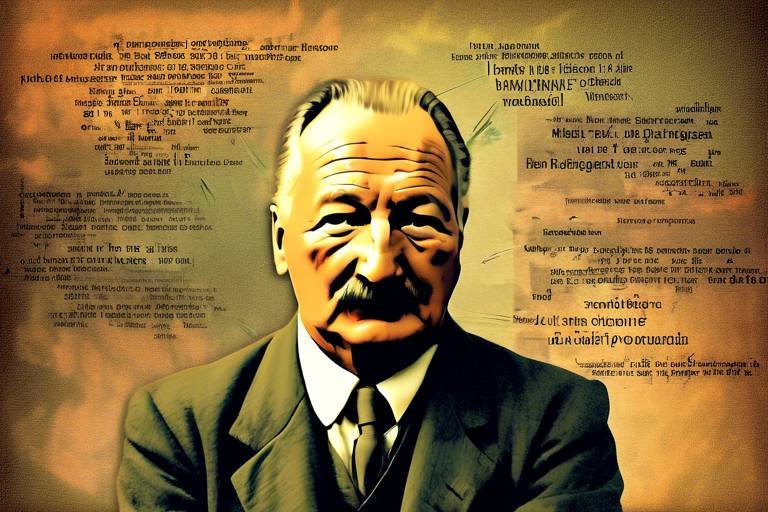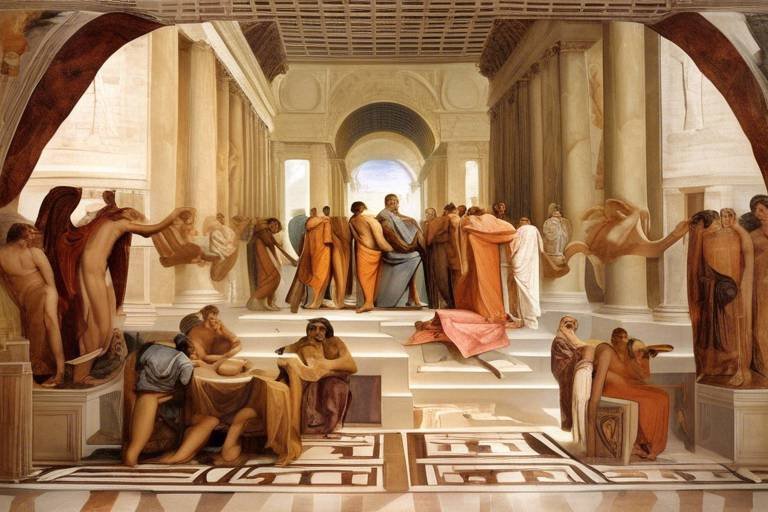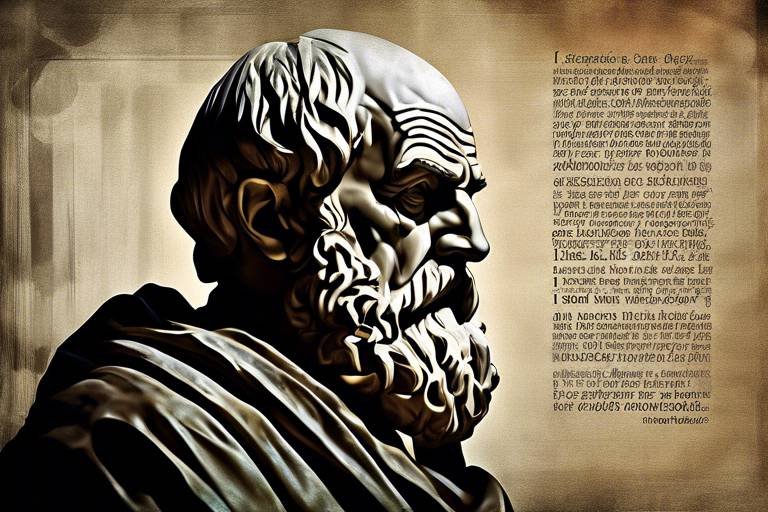Truth and Fiction - A Philosophical Dilemma
Welcome to the fascinating world where truth and fiction collide! This relationship can be as intricate as a spider's web, with threads of meaning woven together in ways that challenge our perceptions of reality. Have you ever found yourself lost in a story, questioning what is real and what is merely a figment of imagination? This article will take you on a journey through the depths of these concepts, exploring their definitions, implications, and significance not only in philosophy but also in literature and our everyday lives.
Understanding the essence of truth is fundamental to navigating the complex landscape of knowledge and belief. Philosophers have long debated what truth really is, and several perspectives have emerged over time. The correspondence theory suggests that truth is what corresponds to reality; it's like a mirror reflecting the world as it is. On the other hand, the coherence theory posits that truth is about the consistency of ideas within a particular system. Finally, the pragmatic theory emphasizes the practical consequences of beliefs—if something works in real life, it can be considered true. Each of these perspectives illuminates different facets of how truth is perceived and defined across various contexts, making it a rich area for exploration.
Fiction plays a crucial role in shaping human experience and understanding. It's not just a means of escape; it’s a powerful lens through which we can examine our own lives and the world around us. Think about your favorite novel or film—how did it influence your thoughts on reality, ethics, or even your emotions? Fictional narratives can profoundly impact our perceptions, often blurring the lines between what we believe to be true and what is simply a narrative construct. This interplay is vital in philosophical discourse, as it challenges us to question our beliefs and the stories we tell ourselves.
Fiction allows individuals to explore complex ideas and moral dilemmas in a safe space. Imagine reading a story about a character faced with a tough ethical decision. Through their journey, you're not just a passive reader; you become an active participant in their moral questioning. This engagement can lead to a deeper understanding of human nature and societal issues. Fiction serves as a mirror reflecting our own struggles and triumphs, providing insights that might be difficult to grasp in the harsh light of reality.
Storytelling is a powerful medium that conveys truths about the human experience. From ancient myths to contemporary novels, narratives have the ability to shape beliefs and values. They resonate with us on a psychological level, often evoking emotions that lead to personal reflection. For instance, consider how a story about love, loss, or redemption can echo your own experiences. This connection between storytelling and emotional engagement highlights the cultural significance of narratives in our lives.
The distinction between fiction and reality often blurs, raising intriguing questions about authenticity and perception. How many times have you encountered a fictional representation that felt more real than your everyday experiences? This phenomenon can challenge our understanding of truth, leading us to reconsider what we deem as authentic. Fiction can reinforce our beliefs, but it can also challenge them, prompting us to explore new perspectives and ideas.
Throughout history, various philosophers have contributed to the discourse on truth. Thinkers like Plato, who famously posited the existence of an ideal realm of forms, or Nietzsche, who questioned the very nature of truth itself, have shaped our understanding. Each theory offers unique insights into how we perceive truth in both fictional and non-fictional contexts. By examining these perspectives, we can gain a richer understanding of the philosophical underpinnings that inform our beliefs.
Exploring the overlap between truth and fiction reveals fascinating insights. Literary works can convey profound truths, even if they are entirely fictional. For instance, a novel may address themes of love, justice, or the human condition, providing readers with a deeper understanding of these concepts. The implications of this relationship are significant, as it suggests that fiction can be a vehicle for truth, challenging our perceptions and encouraging us to think critically about our beliefs.
Fiction often tackles ethical dilemmas, prompting readers to question moral principles. When faced with difficult choices in a story, we find ourselves grappling with our own values and beliefs. This exploration of ethics through fiction can illuminate moral considerations and influence our reasoning. It’s like a thought experiment that allows us to navigate complex issues without the real-world consequences.
In an era dominated by digital media, the nature of truth is increasingly complex. With the rise of social media and instant information, how do we discern what is true and what is false? Misinformation can spread like wildfire, challenging our understanding of reality. The digital landscape forces us to confront issues of authenticity, urging us to become more critical consumers of information. In this context, the relationship between truth and fiction becomes even more vital to explore, as we navigate a world where the lines are often blurred.
- What is the difference between truth and fiction? Truth refers to facts or reality, while fiction is a narrative created from imagination.
- Can fiction convey truth? Yes, fiction can express profound truths about human experiences and moral dilemmas.
- How does storytelling impact our understanding of truth? Storytelling engages emotions and reflections, allowing us to explore complex ideas and beliefs.
- Why is it important to understand the nature of truth? Understanding truth helps us navigate our beliefs and the information we encounter in daily life.

The Nature of Truth
Understanding the essence of truth is fundamental to navigating our complex world. It's not merely a concept; it's a cornerstone of our interactions, beliefs, and even our identities. But what exactly is truth? Philosophers have grappled with this question for centuries, offering various perspectives that shape our understanding. At its core, truth can be seen through multiple lenses: the correspondence theory, the coherence theory, and the pragmatic theory. Each of these theories provides a unique insight into how we perceive and define truth across different contexts.
The correspondence theory posits that truth is what corresponds to reality. In other words, a statement is true if it accurately reflects the world as it is. Imagine a photograph: it captures a moment in time, representing the truth of that moment. This perspective is intuitive and aligns with our everyday experiences. However, it raises questions about the nature of reality itself. Can we ever truly capture reality, or are we merely creating representations of it?
On the other hand, the coherence theory suggests that truth is a matter of consistency within a set of beliefs. This theory argues that a proposition is true if it fits harmoniously within a broader system of beliefs. Think of it like a puzzle: each piece must connect to others to form a coherent image. This perspective emphasizes the interconnectedness of our beliefs and how they shape our understanding of truth. But what happens when our beliefs conflict? How do we reconcile differing truths?
Then, there’s the pragmatic theory, which takes a more practical approach. According to this view, truth is determined by the practical consequences of beliefs. If a belief works effectively in real-life situations, it can be considered true. This theory resonates with our daily lives, as we often rely on outcomes to validate our truths. However, it raises a critical question: does effectiveness equate to truth, or is it merely a convenient measure?
As we delve deeper into these theories, it becomes clear that truth is not a one-size-fits-all concept. It is shaped by context, culture, and individual perception. In a world where information is abundant and often contradictory, understanding the nature of truth becomes increasingly crucial. We must navigate the murky waters of belief and skepticism, constantly questioning what we accept as true.
Moreover, the implications of these theories extend beyond philosophy into everyday life. For instance, consider the impact of social media on our understanding of truth. Platforms often blur the lines between fact and opinion, leading to a crisis of credibility. The challenge lies in discerning what is true amidst a sea of misinformation. This reality compels us to cultivate critical thinking skills and a healthy skepticism.
In conclusion, the nature of truth is a rich tapestry woven from various philosophical threads. Whether we view it through the lens of correspondence, coherence, or pragmatism, each perspective offers valuable insights. Ultimately, the quest for truth is not just an intellectual exercise; it's a journey that shapes our understanding of ourselves and the world around us.
- What is the correspondence theory of truth? - It posits that a statement is true if it accurately reflects reality.
- How does the coherence theory differ from the correspondence theory? - The coherence theory states that truth is based on the consistency of a set of beliefs.
- What is the pragmatic theory of truth? - This theory suggests that truth is determined by the practical consequences of beliefs.
- Why is understanding truth important in today's world? - In an age of information overload, discerning truth helps navigate misinformation and enhances critical thinking.

The Role of Fiction
Fiction is not just a form of entertainment; it serves as a powerful lens through which we can examine the complexities of human experience. Through the art of storytelling, fiction allows us to immerse ourselves in worlds that, while not real, resonate with our emotions, beliefs, and values. Have you ever found yourself lost in a novel, feeling as though the characters were your friends, their struggles mirroring your own? This connection is what makes fiction so significant. It transcends the boundaries of time and culture, enabling readers to engage with ideas and emotions that might otherwise be difficult to confront in the real world.
Moreover, fiction acts as a mirror reflecting societal norms and challenges. It provides a platform for exploring ethical dilemmas and moral questions that can be uncomfortable to face directly. For instance, consider how a novel like George Orwell's 1984 compels us to confront issues of surveillance, freedom, and truth. Through its narrative, we are invited to ponder: What does it mean to be free? How do we define truth in a world filled with propaganda? Such questions are not merely academic; they resonate deeply within our personal lives and the society we inhabit.
Fiction also plays a crucial role in shaping our perceptions of reality. By presenting us with alternative viewpoints and experiences, it challenges our preconceived notions. When we read a story from a different cultural perspective, we are not just entertained; we are educated. We gain insights into the lives of others, fostering empathy and understanding. This is particularly vital in our increasingly globalized world, where understanding diverse perspectives is essential for coexistence.
Furthermore, the emotional engagement that fiction offers is unparalleled. The characters we meet and the plots we follow often evoke a range of feelings, from joy to sorrow, anger to relief. This emotional journey can lead to profound personal reflection. For example, a story about loss may help someone process their own grief, while a tale of resilience might inspire them to overcome challenges in their life. Fiction provides a safe space to explore these feelings without the risk of real-world consequences.
In the context of philosophical discourse, fiction's role becomes even more intriguing. It allows for the exploration of abstract concepts in a tangible way. Through narrative, complex ideas about existence, morality, and the human condition can be articulated and examined. For instance, the philosophical inquiries presented in works by authors like Fyodor Dostoevsky or Albert Camus invite readers to grapple with existential questions in a format that feels accessible and relatable.
In essence, the role of fiction is multifaceted. It is a tool for understanding, a vehicle for emotional exploration, and a means of engaging with ethical questions. By inviting us into its imaginative realms, fiction not only entertains but also enriches our understanding of ourselves and the world around us. It serves as a reminder that while our lives may be rooted in reality, the stories we tell and the truths we uncover through fiction can be just as impactful, if not more so. So the next time you pick up a book or watch a movie, remember: you’re not just escaping reality; you’re diving into a deeper understanding of it.
- How does fiction influence our understanding of reality?
Fiction provides alternative perspectives that challenge our beliefs and foster empathy, enriching our understanding of the world. - Can fiction help us with moral dilemmas?
Yes! Fiction often presents ethical challenges that encourage readers to reflect on their own moral values and decisions. - Why is storytelling important in society?
Storytelling preserves cultural heritage, promotes social cohesion, and helps individuals process their experiences and emotions. - Is all fiction valuable?
While not all fiction may resonate with everyone, each story has the potential to offer insights or provoke thought in different ways.

Fiction as a Tool for Understanding
Fiction is more than just a form of entertainment; it's a powerful lens through which we can examine the complexities of human existence. Think about it: when we immerse ourselves in a novel or a film, we often find ourselves grappling with ideas and emotions that resonate deeply within us. This is because fiction provides a safe space for exploring intricate concepts and moral dilemmas that might be too challenging to confront in reality. Through the stories we read and the characters we meet, we can engage with the world in a way that is both reflective and transformative.
One of the most significant aspects of fiction is its ability to evoke empathy. When we follow a character's journey, we are invited to step into their shoes, experiencing their struggles, triumphs, and failures. This immersive experience allows us to understand perspectives that are vastly different from our own. For instance, consider a novel that depicts the life of someone from a marginalized community. Through their story, we can gain insight into the challenges they face, fostering a sense of empathy that might not have emerged through mere statistics or news reports. In this way, fiction serves as a bridge, connecting us to the human experience in a profound manner.
Moreover, fiction often tackles complex themes—such as love, loss, betrayal, and redemption—allowing readers to ponder these subjects in a nuanced way. Here are a few key ways in which fiction acts as a tool for understanding:
- Exploration of Moral Dilemmas: Fiction often places characters in situations where they must make tough decisions, prompting readers to reflect on their own values and beliefs.
- Reflection of Society: Many fictional works mirror societal issues, such as inequality or injustice, encouraging readers to think critically about the world around them.
- Emotional Engagement: The emotional arcs of characters can resonate deeply, allowing readers to process their own feelings and experiences.
Additionally, fiction can be a tool for cognitive development. Engaging with narratives enhances our critical thinking skills, as we analyze characters' motivations and the consequences of their actions. This analytical process is akin to solving a puzzle; as we piece together the narrative, we cultivate a deeper understanding of human behavior and societal dynamics. In essence, fiction challenges us to think beyond our immediate experiences and consider the broader implications of our choices.
In conclusion, fiction is not merely a distraction from reality; it is a vital tool for understanding the world and ourselves. It invites us to explore the depths of human emotion, grapple with ethical questions, and reflect on the societal structures that shape our lives. By engaging with fictional narratives, we not only entertain ourselves but also enrich our understanding of what it means to be human. So, the next time you pick up a book or watch a movie, remember that you are not just consuming a story; you are participating in a profound exploration of truth, morality, and the intricate tapestry of life.
Q: How can fiction help in understanding complex social issues?
A: Fiction often reflects societal challenges, allowing readers to see these issues from different perspectives, fostering empathy and awareness.
Q: Does reading fiction improve emotional intelligence?
A: Yes, engaging with characters' emotional journeys can enhance our ability to understand and manage our own emotions and those of others.
Q: Can fiction influence moral decision-making?
A: Absolutely! Fictional narratives often present ethical dilemmas that prompt readers to reflect on their own values and moral beliefs.

The Impact of Storytelling
Storytelling is more than just a means of entertainment; it is a profound medium that shapes our understanding of the world around us. From ancient cave paintings to modern films, stories have served as vessels for conveying truths about the human experience. They allow us to explore complex emotions, navigate moral dilemmas, and connect with others on a deeply personal level. Think about it—when was the last time a story made you laugh, cry, or reflect on your own life? The power of storytelling lies in its ability to evoke feelings and provoke thought.
At its core, storytelling creates a shared experience. It transcends cultural and societal boundaries, allowing individuals from different backgrounds to find common ground. Consider how fairy tales, myths, and legends have been passed down through generations, each time morphing slightly but retaining the essence of their message. This continuity highlights the importance of storytelling in preserving culture and fostering community.
Moreover, stories often serve as mirrors reflecting our values and beliefs. They can challenge societal norms and inspire change. For instance, novels like George Orwell's "1984" or Harper Lee's "To Kill a Mockingbird" expose injustices and provoke critical thinking about authority, morality, and human rights. By immersing ourselves in these narratives, we can gain insights into our own lives and the world at large. This is why storytelling is not just an art form; it is a tool for social commentary.
In educational settings, storytelling enhances learning by engaging students and making complex ideas more relatable. When teachers use stories to illustrate concepts, they help students visualize and internalize information. This method fosters a deeper understanding and retention of knowledge, proving that stories can be both entertaining and educational.
Furthermore, the psychological impact of storytelling is significant. Research has shown that narratives can activate the brain's empathy centers, allowing us to walk in someone else's shoes. This empathy is crucial for building relationships and understanding diverse perspectives. Through stories, we can explore the depths of human emotion, grappling with themes of love, loss, and redemption. It’s as if each tale acts as a window into the soul, helping us to connect with our own humanity.
In conclusion, the impact of storytelling is multifaceted. It shapes our perceptions, influences our beliefs, and fosters a sense of community. As we navigate an increasingly complex world, the ability to tell and share stories remains a vital skill. Whether through books, films, or oral traditions, storytelling continues to enrich our lives and illuminate the truths that bind us all together.
- What is the purpose of storytelling? Storytelling serves to entertain, educate, and connect people, allowing them to explore complex ideas and emotions.
- How does storytelling impact culture? It preserves cultural values and promotes shared experiences, helping communities to bond and understand one another.
- Can storytelling influence moral reasoning? Yes, storytelling often presents ethical dilemmas that encourage readers to reflect on their own moral beliefs and decisions.
- What role does empathy play in storytelling? Stories activate the brain's empathy centers, allowing readers to connect with characters and understand diverse perspectives.

Fiction vs. Reality
In our daily lives, the line between fiction and reality can often become blurred, creating a fascinating interplay that challenges our perceptions and beliefs. Fiction, with its elaborate plots and characters, serves as a mirror reflecting aspects of our reality. Yet, it also stretches our imagination, allowing us to explore worlds that exist only in our minds. This raises an intriguing question: how do we differentiate between what is real and what is merely a product of someone’s imagination?
One way to understand this relationship is to consider how fiction can both reflect and shape our reality. For instance, novels like George Orwell's 1984 or Margaret Atwood's The Handmaid's Tale offer dystopian visions that, while fictional, provoke critical discussions about our societal norms and political structures. These narratives compel us to confront uncomfortable truths about power, freedom, and morality. They serve as cautionary tales, reminding us that the boundaries of reality can be manipulated, much like the narratives we consume.
Moreover, fictional narratives can challenge our understanding of truth by presenting scenarios that question our ethical frameworks. Consider how a character's decision in a gripping story might resonate with you on a personal level, prompting you to reflect on your own values and choices. This emotional engagement illustrates how fiction can act as a catalyst for introspection, allowing us to explore complex ideas without the constraints of reality. In essence, fiction provides a safe space to grapple with moral dilemmas, enabling us to navigate the murky waters of human experience.
However, the impact of fiction isn't solely confined to literature. The rise of digital media has amplified the fusion of fiction and reality, leading to a landscape where fictional representations can heavily influence public perception. Think about the role of movies, television shows, and even social media narratives. These platforms often present dramatized versions of events, which can skew our understanding of actual occurrences. For instance, news outlets may frame stories in a particular light, shaping public opinion in ways that echo the dramatic arcs found in fiction.
To illustrate this point, let’s consider a few examples:
| Medium | Fictional Representation | Impact on Reality |
|---|---|---|
| Film | Biopics often dramatize historical events | Can lead to misconceptions about actual events |
| Social Media | Influencers creating idealized lifestyles | Shifts public perception of normalcy and success |
| News | Framing of political events | Shapes public opinion and discourse |
As we navigate this intricate web of fiction and reality, it’s essential to remain critical of the narratives we encounter. Just as we wouldn’t take every fictional story at face value, we should approach media representations with a discerning eye. The challenge lies in recognizing that while fiction can illuminate truths about human nature, it can also distort our understanding of reality. This realization invites us to engage with both fiction and reality more thoughtfully, appreciating the nuanced relationship between the two.
- How can fiction influence our perception of reality? Fiction often mirrors real-life experiences and societal issues, prompting readers to reflect on their own beliefs and values.
- Is it possible for fiction to convey truth? Absolutely! Many fictional narratives explore profound truths about the human experience, even if they are not factual.
- What role does storytelling play in shaping our understanding of ethics? Storytelling allows us to engage with complex moral dilemmas in a safe context, helping us to analyze and question our ethical principles.

Philosophical Perspectives on Truth
When we dive into the philosophical waters of truth, we find ourselves navigating through a myriad of theories and perspectives that have shaped human thought for centuries. At its core, the concept of truth is not just a simple agreement with reality; it is a complex tapestry woven from various threads of understanding. Philosophers have long debated what truth actually is, leading to several key theories that provide different lenses through which to view this elusive concept.
One of the most well-known theories is the correspondence theory of truth, which posits that truth is what corresponds to reality. In other words, a statement is true if it accurately describes the world as it is. For instance, the statement "The sky is blue" is considered true because it can be verified through observation. This theory appeals to our instinctive desire for truth to align with observable facts, making it a foundational perspective in both philosophy and science.
On the other hand, we have the coherence theory of truth, which suggests that truth is not merely about correspondence to reality but rather about the consistency and coherence of beliefs within a system. Imagine a puzzle where every piece must fit together seamlessly; if a new piece disrupts the harmony, it may be deemed false. This theory emphasizes the interconnectedness of our beliefs and how they collectively contribute to what we perceive as true. It raises intriguing questions about the relativity of truth, especially in different cultural or philosophical contexts.
Then there’s the pragmatic theory of truth, which takes a more practical approach. According to this view, truth is what works or what is useful in a given context. If a belief leads to successful action or outcomes, it can be considered true. This perspective resonates with many in our fast-paced, results-driven world, where the utility of an idea often takes precedence over its absolute accuracy. However, it also invites skepticism about whether we can truly define truth based solely on effectiveness.
These theories not only enrich our understanding of truth but also highlight the philosophical dilemmas that arise when we consider the relationship between truth and fiction. For instance, if a fictional narrative resonates deeply with readers and prompts them to reflect on their own beliefs, can we still regard it as 'false'? This question challenges us to reconsider the boundaries between truth and fiction, suggesting that perhaps the emotional and intellectual truths conveyed through storytelling hold their own significance.
As we explore these philosophical perspectives, it's essential to recognize that truth is not a monolith. It is multifaceted and often subjective, shaped by personal experiences, cultural backgrounds, and societal norms. The ongoing discourse around truth invites us to engage critically with our beliefs and the narratives we encounter, whether they be in literature, media, or everyday conversations.
In conclusion, understanding the philosophical perspectives on truth allows us to appreciate the complexity of this concept. It encourages us to ask deeper questions about our own beliefs and the truths we encounter in both fiction and reality. As we continue to navigate this philosophical landscape, we must remain open to the myriad ways in which truth can be perceived, understood, and expressed.
- What is the correspondence theory of truth? It suggests that truth is what corresponds to reality, meaning a statement is true if it accurately describes the world.
- How does the coherence theory differ from the correspondence theory? The coherence theory posits that truth is about the consistency of beliefs within a system, rather than just alignment with reality.
- What is the pragmatic theory of truth? This theory states that truth is determined by what works or is useful in a given context.
- Can fiction convey truth? Yes, fiction can convey emotional and intellectual truths that resonate with readers, despite being a product of imagination.

The Intersection of Truth and Fiction
The relationship between truth and fiction is not merely a philosophical curiosity; it is a vibrant tapestry that weaves through the fabric of our understanding of the world. At first glance, one might think that truth and fiction are opposites, like oil and water, forever destined to remain separate. However, when you dive deeper, you discover that they often intermingle, creating a rich dialogue that challenges our perceptions and beliefs. Consider this: can a story that is entirely fabricated hold more truth than a factual account? This question lies at the heart of our exploration.
Literary works, whether they are novels, plays, or even poems, frequently encapsulate profound truths about the human condition, society, and moral dilemmas. For instance, George Orwell's 1984 is a fictional narrative that, while not a historical account, sheds light on the dangers of totalitarianism and the manipulation of truth. Through its dystopian lens, readers gain insights into the nature of power and the fragility of personal freedom. Here, fiction serves as a mirror, reflecting the stark realities of our existence while simultaneously allowing us to engage with complex themes in a safe and imaginative space.
Moreover, the intersection of truth and fiction can often lead to a greater understanding of ethical considerations. Fictional scenarios compel us to ponder moral questions that might be too daunting to face in reality. Think about the ethical dilemmas presented in stories like To Kill a Mockingbird or The Good Place. These narratives force us to confront our biases, empathize with others, and question our moral compass. They invite us to step into the shoes of characters facing difficult choices, ultimately allowing us to reflect on our values and principles.
As we navigate this complex landscape, it's essential to acknowledge that the lines between truth and fiction can become blurred, especially in today’s digital age. With the rapid spread of information through social media and various online platforms, distinguishing between authentic narratives and fabricated ones has become increasingly challenging. This phenomenon raises critical questions: How do we ascertain the truth in a world rife with misinformation? Can fictional narratives help us discern what is real? In many instances, they can. Fiction can illuminate the nuances of truth by presenting it in ways that are more relatable and digestible, allowing for a deeper understanding of complex issues.
Ultimately, the intersection of truth and fiction is not just a philosophical debate; it is a dynamic interplay that shapes our realities and influences our beliefs. As readers and thinkers, we must remain vigilant and discerning, recognizing that both truth and fiction have valuable roles to play in our quest for understanding. They are not enemies but rather allies in the pursuit of knowledge, wisdom, and empathy.
- What is the main difference between truth and fiction? Truth refers to facts or reality, while fiction is a creation of the imagination that may convey deeper insights or moral lessons.
- Can fiction convey truth? Absolutely! Fiction can reveal profound truths about human experiences, ethics, and societal issues, often more effectively than straightforward facts.
- How does digital media affect our understanding of truth and fiction? Digital media can complicate our understanding by spreading misinformation, making it harder to distinguish between what is real and what is not.
- Why is understanding the intersection of truth and fiction important? It helps us navigate complex moral dilemmas and enhances our critical thinking skills, allowing us to engage more thoughtfully with the world around us.

Ethics in Fiction
Fiction is not just a means of entertainment; it serves as a profound platform for exploring ethical dilemmas that challenge our moral compass. Through the lens of storytelling, authors can present complex situations that force readers to confront questions about right and wrong, justice and injustice, and the very fabric of human morality. Think of it as a moral laboratory where the stakes are high, yet the consequences are safely contained within the pages of a book.
When we engage with fictional narratives, we often find ourselves in the shoes of characters facing tough choices. These scenarios can be a reflection of real-world issues, prompting us to consider how we would act in similar situations. For instance, a character might be faced with a decision to save a loved one at the expense of many others. This situation not only raises questions about personal loyalty versus the greater good but also encourages readers to grapple with their own ethical beliefs. It’s like a mirror reflecting our values and prompting us to evaluate them critically.
Moreover, fiction can illuminate ethical considerations in ways that straightforward philosophical texts might not. It allows for emotional engagement, which is crucial for understanding the nuances of morality. Here are some key ways in which fiction influences our ethical reasoning:
- Empathy Building: By connecting with characters, readers often develop a deeper sense of empathy, which can influence their real-life moral decisions.
- Complexity of Choices: Fiction often presents morally ambiguous situations that highlight the complexity of ethical decision-making.
- Reflection of Society: Many fictional works serve as a critique of societal norms, encouraging readers to question accepted moral standards.
In essence, fiction becomes a powerful tool for ethical exploration. It can challenge our preconceived notions and push us to think critically about our moral frameworks. For example, novels like To Kill a Mockingbird or The Handmaid's Tale not only entertain but also provoke thought about justice, equality, and human rights. They invite readers to reflect on their own beliefs and the implications of their actions within society.
Furthermore, the ethics presented in fiction can lead to discussions that extend beyond the narrative itself. Book clubs, classrooms, and online forums often dissect these ethical dilemmas, fostering a community of thinkers who engage with the material on a deeper level. This collective reflection can lead to a greater understanding of complex moral issues and inspire change in real life.
Ultimately, the intersection of ethics and fiction is a rich area for exploration. As readers, we are not just passive consumers of stories; we become active participants in a dialogue about morality, ethics, and what it means to be human. The questions raised in fiction can linger long after the last page is turned, prompting ongoing reflection and discussion about the ethical dimensions of our lives.
Q: How does fiction help in understanding ethics?
A: Fiction allows readers to explore moral dilemmas in a safe space, encouraging empathy and critical thinking about real-life ethical issues.
Q: Can fictional stories influence real-world behavior?
A: Yes, engaging with characters and their choices can inspire readers to reflect on their own values and actions, potentially influencing their behavior.
Q: Are there specific genres of fiction that focus more on ethics?
A: While many genres touch on ethical themes, literary fiction and dystopian narratives often delve deeper into moral complexities and societal critiques.

Truth in the Digital Age
In today's fast-paced world, where information travels at the speed of light, the concept of truth has become a complex web of challenges and opportunities. The digital age has revolutionized how we consume and perceive information, leading to a landscape where the boundaries between fact and fiction are often blurred. With just a few clicks, anyone can access a plethora of sources claiming to deliver the "truth," but how do we discern what is genuine and what is merely a fabrication?
One of the most pressing issues we face is the rise of misinformation and disinformation. Misinformation refers to false or misleading information shared without malicious intent, while disinformation is deliberately deceptive. This distinction is crucial because it influences how we respond to the information we encounter. For instance, during significant global events, such as elections or health crises, the spread of misinformation can lead to panic, confusion, and even harm. The challenge lies in identifying trustworthy sources amidst the noise. In fact, a recent study revealed that over 70% of people have encountered false information online, highlighting the urgent need for critical thinking and media literacy skills.
Moreover, the algorithms that govern social media platforms often amplify sensational content, which can distort our understanding of reality. These algorithms prioritize engagement over accuracy, leading to a scenario where the most outrageous claims gain traction. It's like a game of telephone, where the original message is lost, and what remains is a distorted echo of the truth. As users, we must navigate this digital minefield with caution and skepticism, questioning the sources and motives behind the information we consume.
To combat the challenges posed by the digital landscape, several strategies can be employed:
- Verify Sources: Always check the credibility of the source before accepting information as true. Look for reputable organizations or experts in the field.
- Cross-Reference Information: Compare information across multiple sources to ensure consistency and accuracy.
- Be Skeptical of Sensationalism: If a headline seems too outrageous or unbelievable, take a moment to investigate further.
Additionally, the digital age has given rise to new forms of storytelling that blur the lines between truth and fiction. For example, documentaries and docudramas often blend factual narratives with dramatized elements, creating a compelling yet potentially misleading portrayal of events. As consumers of media, we must remain vigilant and recognize that even well-crafted stories can carry biases and subjective interpretations.
Ultimately, the quest for truth in the digital age is a shared responsibility. It requires a collective effort from individuals, educators, and technology companies to foster an environment where accurate information thrives. As we navigate this intricate landscape, let us embrace the challenge of being informed citizens, equipped with the tools to discern fact from fiction in an ever-evolving digital world.
- What is misinformation, and how does it differ from disinformation? Misinformation is false or misleading information shared without malicious intent, while disinformation is deliberately deceptive.
- How can I verify the credibility of a source? Look for reputable organizations, check author credentials, and cross-reference information with other reliable sources.
- Why are algorithms important in the context of truth and fiction? Algorithms can amplify sensational content, making it crucial to understand their role in shaping our information landscape.
Frequently Asked Questions
- What is the definition of truth in philosophy?
Truth in philosophy can be understood through various lenses, such as the correspondence theory, which states that truth is what corresponds to reality. There's also the coherence theory, suggesting that truth is based on the consistency of beliefs within a system, and the pragmatic theory, which defines truth through practical outcomes and usefulness in everyday life.
- How does fiction influence our understanding of truth?
Fiction plays a significant role in shaping our perceptions of truth by providing narratives that allow us to explore complex ideas and moral dilemmas. Through storytelling, we can engage with different perspectives and emotions, which helps us reflect on our beliefs and values in a more profound way.
- Can fictional stories convey real truths?
Absolutely! Fiction often conveys deep truths about the human experience, even if the stories themselves are not factual. Literary works can illuminate ethical considerations and societal issues, prompting readers to question their understanding of reality and morality.
- What is the relationship between fiction and reality?
The line between fiction and reality can often blur, as fictional narratives can challenge or reinforce our understanding of truth. This relationship raises important questions about authenticity and perception, highlighting how our interpretations of both can be influenced by the stories we tell and consume.
- How do philosophers view the concept of truth?
Philosophers have contributed a plethora of theories about truth, each offering unique insights. Some focus on logical structures, while others emphasize the social and contextual factors that shape our understanding. These perspectives are crucial for grasping how truth operates in both fictional and non-fictional contexts.
- What ethical dilemmas are often explored in fiction?
Fiction frequently delves into ethical dilemmas, presenting scenarios that challenge readers to reflect on their moral principles. These narratives encourage us to think critically about right and wrong, fostering a deeper understanding of ethical considerations in real life.
- How has the digital age affected our perception of truth?
In the digital age, the nature of truth has become increasingly complex due to the prevalence of misinformation and the rapid spread of information through social media. This environment poses challenges to our understanding of authenticity and requires us to be more discerning about the sources we trust.

